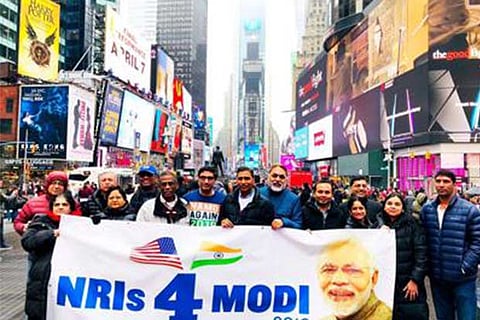

Chennai
One may begin to live independently hundreds of kilometres away from the motherland, but the emotional bonding between the mother and child remains intact for life. Moments of happiness and sorrow show up even in a state of detached attachment. That perhaps explains the immigrant’s attachment to Indian politics.
Their plans to watch the vote count could not have been more elaborate, especially for a weekday — a rare practice in the US, where only weekends are blocked to celebrate even festivals like Deepavali. Meetings between friends, friendly chats in WhatsApp and Facebook groups, dominated the day. Even those reluctant to follow politics, could not escape the temptations raised by social media postings. Many were glued to their TV sets and computer screens the whole night, while still others were lucky to get to election watch centres organised by local enthusiasts. In Minnesota, a cinema hall was booked to screen the election coverage the whole night, while in New Jersey, besides organising celebrations and election watch centers, sweet some shops and restaurants treated people with freebies; watch centres remained active through the night in Houston as well.
The participants were men and women, who moved out of their country long ago. Most of them don’t have Indian passports; many had left the country even before attaining the voting age to have cast their first ballot. The ‘roti, kapda aur makan’ promises made by politicians are not meant to impact their lives and remember, the job creation policies or the price impact of GST don’t concern them anyway. Yet they stayed up the whole night with all pride to follow the politics of the country they come from. It was an outburst of emotion. But, will it be correct to associate this with patriotism? Pundits argue that it is not, because they have crossed the geographical boundaries so that could not qualify patriotism. So, why then would the Indian elections be important to the immigrants?
“On the way to work, a stranger on the train smiled and asked me if I was from India. He then said that he read that our election results were supposed to be declared and asked me for updates. It is in moments like these that a sense of belonging grips me and I don’t feel like moving away from the TV to watch the election coverage,” said Babu Manikandan, a software engineer in his early forties.
Endorsing this view Sridhar Venkatesh, who moved to the US recently on a work visa, said, “While I was taking an Uber ride to the airport, the African American driver asked me if I come from the county where Modi is the leader, checking casually if he would win the elections for the second time. This gave me a sense of belonging.”
Rajendran Swaminathan, who is in his mid-fifties and had moved to the US as student, said, “In a lunchroom conversation, when an American colleague asks me if I was going to visit the Kumbh Mela, and discusses about the elaborate event keen to know the implications of taking a dip in the Ganges that also happens to be in his bucket list, I can’t but feel proud as I think about the political leadership that make such things happen.”
Meanwhile, software executive Vadivel Rajan said, “I still remember how for the first time in many years when an Indian Prime Minister’s face was flashed on the gigantic electronic screens as he addressed the Indian Diaspora at the Times Square which is one of the busiest places in the world. As Indian Americans thronged to get a glimpse of the magic in the streets of New York, with all the tickets to Madison Square garden sold out, it was a moment of pride as every non-Indian passerby stopped to ask: who is the man and what is the event with such fanfare?”
Goosebumps takeover as emotions run high when Indians here see political leaders of their homeland in the US media shaking hands with the US President. This certainly boosts the image of every Indian immigrant, making them swell with pride. These moments add strength to the voice as immigrants in this part of the world. Be it municipal representation, or pushing a bill at the senate, or local school board representation or at corporate desks, immigrants do get noticed for the strength of the leadership back in their country.
Travelling to India, after a stop at Dubai and landing at the Chennai or Mumbai airport, it is the experience of world-class sophistication. Political leaders, who drive this change, get an invisible pat on their backs. The sights of four-lane traffic, multi-level bridges, metro-trains and smooth roads might not get noticed by the locals but certainly boosts the morale of the Indians living out of the borders as the international visitors notice them and brings it up during a casual conversation, replacing the earlier talk points on corruption and pot-holed roads. The fact that the Indian digital connectivity is on par with the global standards is all that matters. Irrespective of what the Swaach Bharat campaign meant to Indians, it helped the immigrants by erasing the Slumdog tag.
The influence of political leaders chosen by the ballot papers, on the immigrants’ life, cannot be ignored. Watching the Indian elections is one way of satiating this want.All said and done, the immigrants in this part of the world are still addressed as ‘Indian Americans’. Not possessing the official papers from the Indian government does not make them any less Indian. It’s hard to erase the identity both internally and externally.
— The writer is a journalist based in NewYork
Visit news.dtnext.in to explore our interactive epaper!
Download the DT Next app for more exciting features!
Click here for iOS
Click here for Android